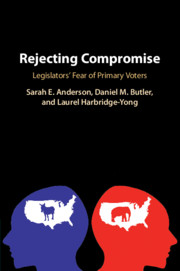Book contents
- Rejecting Compromise
- Rejecting Compromise
- Copyright page
- Contents
- Figures
- Tables
- Acknowledgments
- 1 Rejecting Compromise, Getting Gridlock
- 2 Legislators Reject Half-Loaf Compromises
- 3 Legislators Reject Half-Loaf Compromises Because They Fear Voter Retribution
- 4 Primary Voters as the Source of Punishment
- 5 Voter Punishment Is Rare but Real
- 6 Structuring Negotiations in the Shadow of Primary Voter Punishment
- 7 Compromise, Voter Punishment in Primaries, and Legislative Gridlock
- References
- Index
6 - Structuring Negotiations in the Shadow of Primary Voter Punishment
Published online by Cambridge University Press: 28 January 2020
- Rejecting Compromise
- Rejecting Compromise
- Copyright page
- Contents
- Figures
- Tables
- Acknowledgments
- 1 Rejecting Compromise, Getting Gridlock
- 2 Legislators Reject Half-Loaf Compromises
- 3 Legislators Reject Half-Loaf Compromises Because They Fear Voter Retribution
- 4 Primary Voters as the Source of Punishment
- 5 Voter Punishment Is Rare but Real
- 6 Structuring Negotiations in the Shadow of Primary Voter Punishment
- 7 Compromise, Voter Punishment in Primaries, and Legislative Gridlock
- References
- Index
Summary
Chapter 6 explores reforms that might improve the likelihood of achieving compromise solutions. It tests two different approaches to negotiation with in-person survey experiments at the National Conference of State Legislatures annual Legislative Summits in 2016 and 2017. In one of those experiments, legislators indicate that they are more likely to achieve compromise by negotiating in private (even as they express some trepidation about meeting in private). This suggests that private negotiations might make compromise easier to achieve.
- Type
- Chapter
- Information
- Rejecting CompromiseLegislators' Fear of Primary Voters, pp. 106 - 128Publisher: Cambridge University PressPrint publication year: 2020

